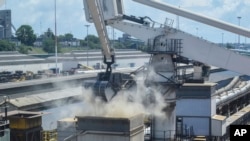"I think we're in slightly more difficult territory at the moment," UN humanitarian chief Martin Griffiths told reporters.
He insisted though that the arguments for continuing were "conclusive and persuasive," stressing that "the Global South ... needs that operation to continue."
Ukraine is one of the world's top cereal producers.
After Russia launched its invasion nearly a year ago, 20 million tons of grain were blocked in its ports until a safe passage deal was agreed.
The hard-won Black Sea Grain Initiative was brokered by the UN and Turkey last July. It was renewed a first time in November and is up for renewal again on March 18.
Nearly 20 million tons of cereal have been exported since then, said Griffiths, insisting: "We don't need it stopped in the middle of March."
"I hope and I believe, actually, that it will be extended. That is because it is an obvious case for international humanitarian security."
Ukraine appealed on Wednesday to the United Nations and Turkey to press Russia to immediately stop hindering Ukrainian grain shipments that supply millions of people and not to use the food as a weapon.
Two top Ukrainian officials said in a joint statement that "Ukraine is deeply concerned about the destructive actions of Russia", which result in the delay of the work of the grain corridor and "obstructing the Black Sea Grain Initiative in general"
Ukraine has repeatedly accused Russia of delaying inspections of ships carrying Ukrainian agricultural goods, leading to reduced shipments and losses for traders.
Russia has previously denied the accusations, saying it is meeting all its obligations under the grain export deal.
One complication to the renewal of the agreement is that the initiative was agreed in parallel with a deal aimed at smoothing the way for exports of Russian fertilizer.
The memorandum of understanding between the UN and Russia - due to last three years - sought to ensure that sanctions imposed on Moscow over the war did not block such exports, which are also seen as vital to the world food supply.
But Moscow has repeatedly complained that the deal is not being respected.
The last time the Black Sea Grain Initiative was up for renewal, Russia briefly threatened to block it over the fertilizer impasse.
Griffiths acknowledged that it was "much more complicated in many ways to make (the fertilizer deal) work."
"But it is important that it does work," he said, insisting that freeing up fertilizer exports is "of the highest priority."
Griffiths said a lot of work had gone into making the deals work, admitting though that there was "a lot more to be done on that front."
This report was sourced from Reuters and Agence France-Presse.
